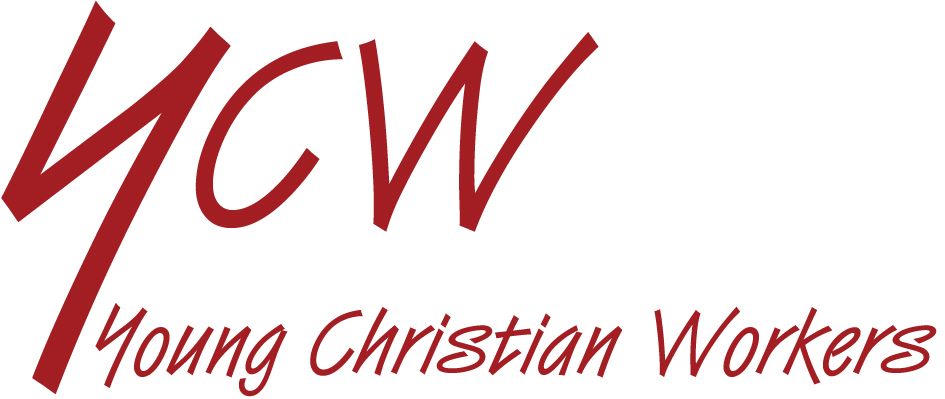YCW History
There can be no doubt that the success and growth of the Young Christian Workers movement was a consequence of the vision, determination and dedication of its founder, Joseph Cardijn. Here you can find a very brief history of Cardijn and the growth of the YCW movement across the world.
1882 - Joseph Cardijn was born in the town of Hal, in Belgium. His parents were Henry and Louise Cardijn. He was a lively boy with an enquiring mind and very sensitive to every human suffering he met, especially that of the workers he saw going to the factories at dawn each morning.
1896 - Aged fourteen, Joseph was preparing to finish his studies and enter the working world. His parents looked forward to the additional household income. However, one night Joseph tells his parents that he wants to be a priest. With no hesitation his parents agree to work harder to allow their son to enter the seminary.
1897 - Joseph enters the junior seminary at Malines. When the holidays came, he visited his schoolmates now working in the factories. But his friends gave him a cold reception believing that he had betrayed them and joined with the forces that oppressed the working class. Their rejection wounded his heart.
1903 - After a lifetime of hard work, Henry Cardijn dies. On his death bed, Joseph promises him that he will give his life to the salvation of the working class of the world.
1906 - Cardinal Mercier ordains Joseph Cardijn a priest.
1912 - Fr. Cardijn was assigned to the Parish of Our Lady of Laeken, Brussels where 13,000 factory workers lived. Fr. Cardijn made a habit of greeting them every morning, walking beside them and asking about their conditions. He was assigned to take charge of the girl’s youth club and organised the members into small groups called “cells”. At each cell meeting a procedure was followed: SEE, JUDGE, and ACT.
1913 - Fernand Tonnet, a local bank clerk, begged Fr. Cardijn to establish similar units for young men.
After two and a half years in Laeken, his workers movement, called the Trade Union Youth initially, is having great success. He set out to ensure good conditions for workers but his fundamental purpose was to restore young people’s sense of personal dignity, to awaken in them an understanding of their true value as brothers and sisters in Christ.
1914 - 1918 - The First World War interrupts the work of Cardijn who was arrested and imprisoned on two separate occasions.
1925 - The title “Trade Union Youth” is changed to “Young Christian Workers”.
Father Cardijn has the opportunity to announce his plans to Pope Pius XI who upon receiving him exclaimed, “Finally, someone speaks to me of the working class.” And then “Not only do we bless your movement - we make it our own.”
1937 - The first YCW group in England is founded in Wigan. Father Gerry Rimmer was the chaplain and Patrick Keegan, a young factory worker, was president. Patrick went on to accompany Cardijn on his international travels, was elected YCW International President and became the first lay man to address an Ecumenical Council of the Church when we addressed the Second Vatican Council on the apostolate of the laity.
1939 - 1945 - The progress of the movement is yet again disturbed by war. Fernand Tonnet and Paul Garcet (two of the three founder members of the YCW in Belgium) die in the extermination camp in Dachau.
1946 - Fr. Cardijn makes several international visits to spread the YCW message. He experiences the terrible injustice in the Third World.
1950 - In the year of the Silver Anniversary, Pope Pius XII honours the YCW by ordaining Father Cardijn as a Bishop. By this point, the YCW had been established in 60 countries across the world.
1958 - Pope John XXIII releases the encyclical ‘Mater et Magistra’ which enshrines Cardijn’s See, Judge, Act methodology. Two key documents of the Second Vatican Council, the Dogmatic Constitution on the Church and the Decree on the Laity, owe much to the vision of Cardijn.
1965 - Pope Paul VI appoints Joseph Cardijn as a Cardinal.
1967 - Cardinal Cardijn was stricken with a kidney ailment and died peacefully on 24th July.
For more information on Joseph Cardijn you can request a copy of ‘A Boy from Flanders’, a short biography from YCW Headquarters.
A collection of Cardijn’s writings can also be bought from our online shop.
Alternatively you can visit www.josephcardijn.com, a website set up and ran by Stefan Gigacz who is a friend of the YCW in England and Wales.
YCW HISTORY IN ENGLAND AND WALES
1937 - The first YCW group in England is founded in Wigan. Father Gerry Rimmer was the chaplain and Patrick Keegan, a young factory worker, was president. The first National Congress was held in Wigan, bringing together 50 young workers and 8 priests.
1938-39 - Launch of the newspaper (and later the magazine) called the “Young Worker”, which was the official organ of the Young Christian Workers for many decades.
1939-45 - Many young members were called up for a range of wartime roles but also continued to lobby for workers’ rights and issues around the dignity of work - including fair wages and good quality housing.
1946 - Message from H.E. Cardinal Griffin – “I am delighted at the magnificent work which is being done by the Young Christian Workers [in England and Wales]. Here is a grand movement, one of the most important and valuable apostolates to-day and one that fits in so well with the modern conditions and with the needs of the present moment.”
1957 - England and Wales YCW send a large delegation on the International Pilgrimage to Rome, filling St Peter’s Square with young people from around the world. It was an eventful journey back, with the train carrying the pilgrims breaking down in France!
1959 - Nottingham YCW pilgrimage to Rome with Mass at the Coliseum and a torchlight procession.
1962 - Cardijn visits King's Hall at Belle Vue in Manchester. He tells the crowd “I am happy and deeply moved to be here before you, and to see and hear you; so numerous, so enthusiastic, so proud of the growth of your movement and of the YCW throughout the world. A rally like today's makes me twenty years younger.”
1966 - Cardijn spoke at the Royal Albert Hall with an audience of 4000 young people. This was to be Cardijn’s last appearance in England before his death in 1967.
1979 - The YCW in England and Wales holds an international Young Workers Rally in Liverpool. Nearly 2000 young workers from all over England, Wales, Ireland, France, Germany and Belgium attended, shared their experiences through exhibition stalls and speeches and saw the launch of the Young Workers Charter.
1982 - Centenary of the birth of Cardijn, with a celebration held in Preston Guild Hall. The YCW HQ moved from 106 Clapham Road, London to West Heath Road, Golders Green, London.
1987-8 - The 50th celebration of the YCW in England and Wales is held, with over 600 YCW leaders from all parts of the country meeting in Liverpool to hold a National Festival. The Festival took the form of exhibitions, displays, musical and dance presentations.
1993 - Pilot groups of the newly organised “junior” organisation IMPACT! were developed and grew quickly. 26 new groups were set up, resources were developed and training was given alongside existing chaplains forums.
2004 - A YCW pilgrimage to Laeken and Halle, in Belgium, takes place. Pilgrims visited the Church of Our Lady in Laeken where Cardijn is buried on the Feast of St Joseph the Worker.
2012 - YCW England and Wales hosts the ICYCW International Congress for the first time in its history. 50 young workers from around the world attend to represent their national movements.
2015 - The YCW moved HQ from London to Trafford Park, Manchester





















